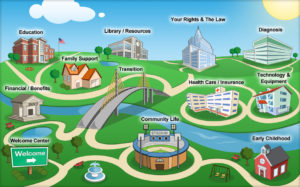MetLife Center for Special Needs Planning
MetLife Center for Special Needs Planning helps families plan for the future of their dependents with special needs, including preserving government benefits and providing insurance and other financial solutions which can help provide lifetime care. Their planning process begins with a review of your dependent’s needs, future care plans, assessment of government benefit eligibility, and a review of your family’s current financial and legal plans.
Location
111 Continental Drive, #S-305
Newark, DE 19713
Contact
1-877-638-3375
(302) 738-0888
Website: https://www.metlife.com/blog/insurance/your-special-needs-child/
10 Basic Steps
Basic Financial Guidance For CaregiversBelow are 10 steps to help caregivers get started in preparing for the financial future of their dependent with special needs. Each circumstance is unique, so caregivers should consider their own situation carefully.
- Plan for future medical, educational and housing needs for your dependent. Start by thinking about what your dependent’s needs will be in the future – and develop your financial strategy based on these projections. Will they need weekly/daily medical treatments? Will they need funds for college? Would they live in a group home or need their own space?
- Review beneficiary designations. To continue to receive federal aid, dependents with special needs cannot have any assets in their name (cash, art, jewelry) that is worth more than $2,000. Check with close friends and family to see if they have designated your dependent to receive any inheritance or insurance benefits from their estate– if they have, it’s important that they leave this amount to your dependent’s special needs trust (see number eight on this list for information on trusts). Don’t let well-intentioned friends and family unknowingly cause your dependent to lose access to valuable resources.
- Have a family meeting to discuss your dependent’s future needs. Just as caring for a dependent with special needs is a family affair, so is the related planning. With the thoughts that you have facilitated your dependent’s special needs throughout their life, meet with your family members to discuss their concerns and options for future care. This is also a good time to broach the beneficiary designation issue discussed above.
- Speak with a special needs financial professional and create a team of professionals to assist you in planning. Once you have determined the current and future financial needs of your dependent with special needs, it’s important to pull together a support team that can help guide you through the variety of options available to you and your family. The composition of the team may vary depending on your unique situation, but it should include an attorney, and perhaps a health professional and a school guidance counselor, among others.
- Contact local nonprofit organizations for additional resource support. Your local nonprofit may be able to provide resources that can help with planning or that supplement the standard services provided by government agencies. A good starting place is to first contact a nonprofit dedicated to your dependent’s special need.
- Apply for government benefits. Government benefits – such as Medicaid and Social Security (www.ssa.gov) – may help provide for your dependent’s needs in the form of medical treatments and supplies, equipment, financial assistance and more. Visit your local Social Security Office to find out what benefits your dependent may qualify for; call or visit their website first to find out what documents you should have with you for your visit.
- Prepare your Last Will and Testament (review and update periodically). A Will declares how you want your estate to be distributed and allows you to select a guardian for your dependent when you pass away. It may be especially important to prevent automatic asset distributions directly to a person with special needs, and to be cognizant to not leave your dependent with special needs any assets in excess of $2,000 (as discussed in number two above.). Speak to your attorney for additional information.
- Consider setting up a special needs trust. This allows caregivers a way to provide for their dependent’s care and quality of life, without disqualifying them for federal assistance. Trusts can be set up either funded or unfunded, and must be overseen by a trustee – often the dependent’s caregiver and/or a bank trust officer. Funds can be contributed gradually over the years, or the trust can be designated as a beneficiary of an inheritance or life insurance policy. The money in the trust must be used to enhance the dependent with special needs quality of life, and can help to supplement standard services and benefits provided by government agencies. Speak to an attorney experienced in special needs planning for more information.
- Apply for guardianship and conservatorship, if applicable. Caregivers must apply for a guardianship or conservatorship to maintain legal control over financial and healthcare decisions once a dependent reaches the age of 18. This can take up to a year in some states, so it’s maybe best to start this process early. There are different levels of guardianship and conservatorship available, depending on the dependent’s capabilities and needs. For example, a limited guardianship could be solely for financial or healthcare-related decisions.
- Prepare a Letter of Intent. Although not legally binding, this document is important for providing direction for the person or persons who will care for your dependent with special needs and should be stored with other vital documents, such as your Will. Thinks of it as a “letter to the caregiver” – it can cover day-to-day care routines such as what medical assistance is needed, as well as quality of life guidance such as what entertainment and activities should be provided.
MetLife does not provide tax or legal advice. We will work with your tax and legal advisors regarding your specific situation.
Info & Resources
If you have a dependent with special needs, you probably have already learned it’s a much more challenging experience to get the best possible services and plans in place if you go it alone. There’s no need to. MetLife Center for Special Needs PlanningSM provides a wealth of information and resources to assist you. Your Special Needs Planner may be the most robust source for information and help but the information here will help you on your special needs planning journey as well.
Planning for your dependent with special needs requires extensive research to compile an enormous amount of information relevant to your loved one’s well-being. You may need up to date medical, educational, financial, and legal information on recent changes in the law. MetLife is here to provide you and your family with assistance addressing the concerns that are unique to your family’s situation.
For more information about the MetLife Center for Special Needs Planning, please call 1-877-638-3375.
However, we realize that your needs may extend beyond the scope of our areas of expertise. MetLife has provided the following links we hope will be helpful to you in your search for additional information and support resources.
Abledata — Information on Assistive Technology
www.abledata.com
The Arc
www.thearc.org
Autism Society
www.autism-society.org
Autism Society of North Carolina
www.autismsociety-nc.org
The Coffee Klatch
www.thecoffeeklatch.com
Down Syndrome Affiliates in Action (DSAIA)
www.dsaia.org
The Exceptional Parent Magazine
www.eparent.com
Family Village — Global Community of Disability-Related Resources
www.familyvillage.wisc.edu
Huntington’s Disease Society of America
www.hdsa.org
L.A. Goal
www.lagoal.org
Learning Opportunities for Individuals with Special Challenges
www.devereux.org
National Alliance on Mental Illness (NAMI)
www.nami.org
National Down Syndrome Congress (NDSC)
www.ndsccenter.org
The National Fragile X Foundation
www.fragilex.org
The National Organization of Rare Disorders (NORD)
www.rarediseases.org
NICHCY — National Dissemination Center for Children with Disabilities
www.nichcy.org/Pages/Home.aspx
The Social Navigator
www.socialnavigatorapp.com/social_navigator.php
(Special Needs Attorneys) Special Needs Alliance
www.specialneedsalliance.com
TASH
www.tash.org
Tuberous Sclerosis Alliance
www.tsalliance.org
United Cerebral Palsy (UCP)
www.ucp.org
Victory Junction
www.victoryjunction.org
The websites listed above were created and are maintained by someone other than MetLife. These websites will have legal notices, privacy policies, or other requirements that differ from those of MetLife, so you may want to review them. We_re providing these links for your convenience. MetLife does not control or guarantee the accuracy, relevance, timeliness, or completeness of any information on these websites. MetLife does not provide tax or legal advice. We will work with your tax and legal advisors regarding your specific situation.


 View the guide to services in Delaware
View the guide to services in Delaware